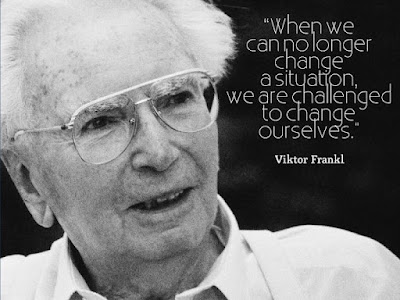Day 25 - Response Ability
 |
| Dr. Viktor Frankl (March 26, 1905 - September 2, 1997) |
On September 2 (today), 1997, Viktor Frankl passed away, but his Yahrtzeit, the anniversary of the Hebrew day of his death, falls on the 30th of Av, Rosh Chodesh Elul. Frankl's life and death, the triumphs and tragedies of his life, and the lessons he taught the world are inextricably connected to the days of Elul and these days of Awe. I highly recommend reading his entire biography on the Viktor Frankl Institutes website - click here. As you read the timeline of his life, you can see how the path of his life changes in 1938 with the annexation of Austria by Hitler and Nazi Germany.
- His career as a Psychiatrist was beginning to come to an end because he was a Jew. His office was 'aryanized', in other words, he was erased from his field. But, Frankl persevered by moving his practice to his parent's home, and continuing to publish in medical journals.
- Frankl becomes the director of the Neurological Department of the Rothschild Hospital, a clinic for Jewish patients. In spite of the danger to his own life, he sabotages Nazi procedures by making false diagnoses to prevent the euthanasia of mentally ill patients. In 1941, Frankl marries Tilly Grosser, a nurse he had met at the Rothschild Hospital. A short time later, the Nazis force the young couple to have their child aborted. They spend most of the war together, but they are separated in 1944. After the war, he learns that she was murdered in the Bergen-Belsen concentration camp
- In 1940, he obtains an immigration visa to America but decides to let it expire, not wanting to desert his old parents. Tragically, his father died of exhaustion after a year and a half in the Theresienstadt camp/ghetto. His mother is murdered in 1944 in the notorious Auschwitz concentration camp.
- In 1941, he writes his dissertation where he lays down the foundations of his system of psychotherapy, Logotherapy and Existential Analysis. Four years later, upon arrival at the Auschwitz-Birkenau concentration camp, he will be forced to throw away the unpublished manuscript. While in the Tuerkheim camp he comes down with typhoid fever. To avoid fatal vascular collapse during the nights he keeps himself awake by reconstructing the manuscript of his book on slips of paper stolen from the camp office.
Frankl lost the most meaningful and precious things in his life: his family, his livelihood, his life's work, and his freedom. Commenting on these losses, Frankl writes, "Everything can be taken from a man but one thing: the last of the human freedoms—to choose one’s attitude in any given set of circumstances, to choose one’s own way.” Commenting on the meaning of life, Frankl says, “Ultimately, man should not ask what the meaning of his life is, but rather must recognize that it is he who is asked. In a word, each man is questioned by life; and he can only answer to life by answering for his own life; to life he can only respond by being responsible.”
In a short time, his occupation, his family, his possessions, and his dignity were taken away from him. But instead of acting and believing like the Nazis wanted him to, he took control of his freedom.
Instead of choosing surrender and apathy, he chose action. During the Holocaust, when two fellow prisoners contemplated suicide he talked to them about things they still had to do. One prisoner had published a series of books on Geography that was unfinished, and the other had a daughter who was safely abroad that long to see him. He gave them hope and meaning, and through this, they were able to control how they lived.
Frankl also believed that we could return to these difficult moments, and rewrite the future. "Live as if you were living already for the second time and as if you acted as wrongly the first time as you are about to act now."
Writing Prompt
Think back to a difficult time in your life, when you were seemingly passive, regardless if you chose passivity or if it was forced upon you. How did you respond to this difficult moment in your life? How long did it take for you to find the ability to change, and what did that change or 'response' look like? Did you act differently when you were put into a similar circumstance? If not, what led you to change?
Comments
Post a Comment